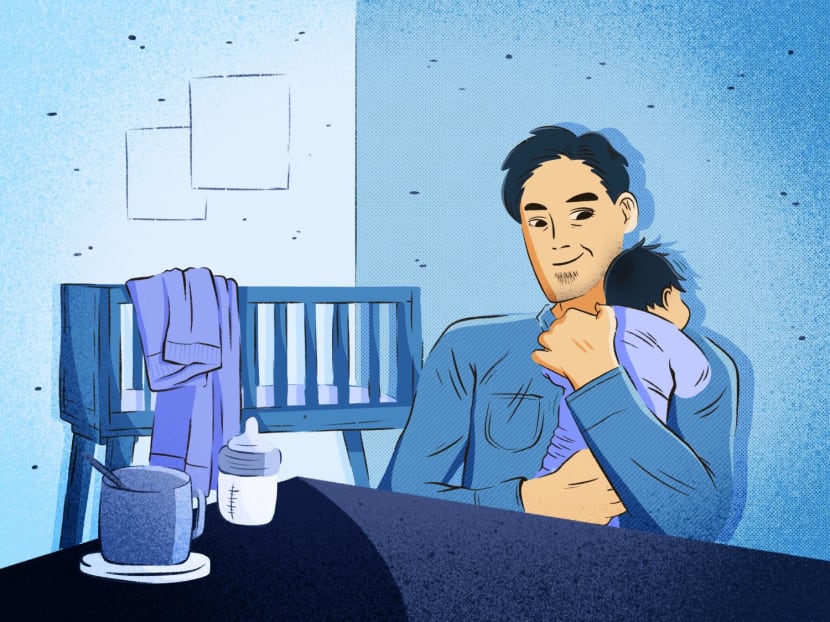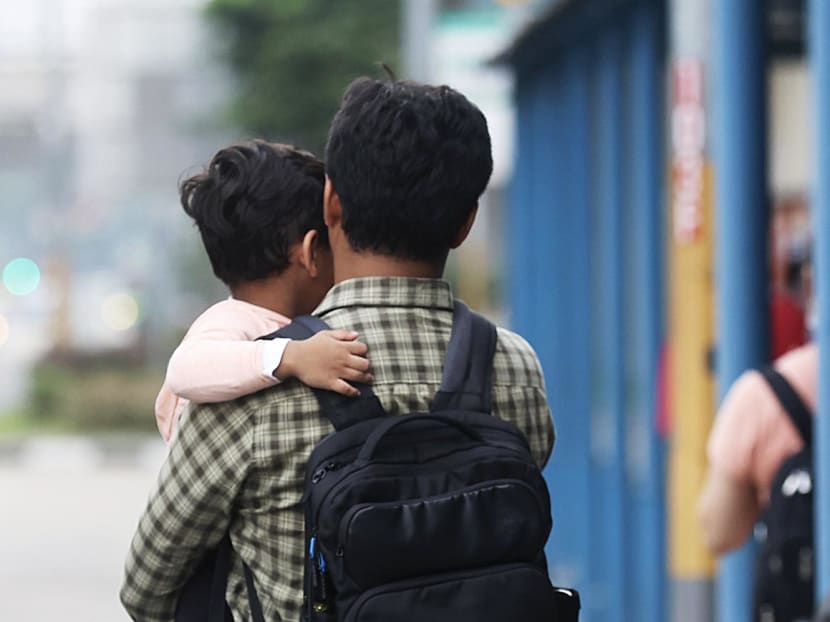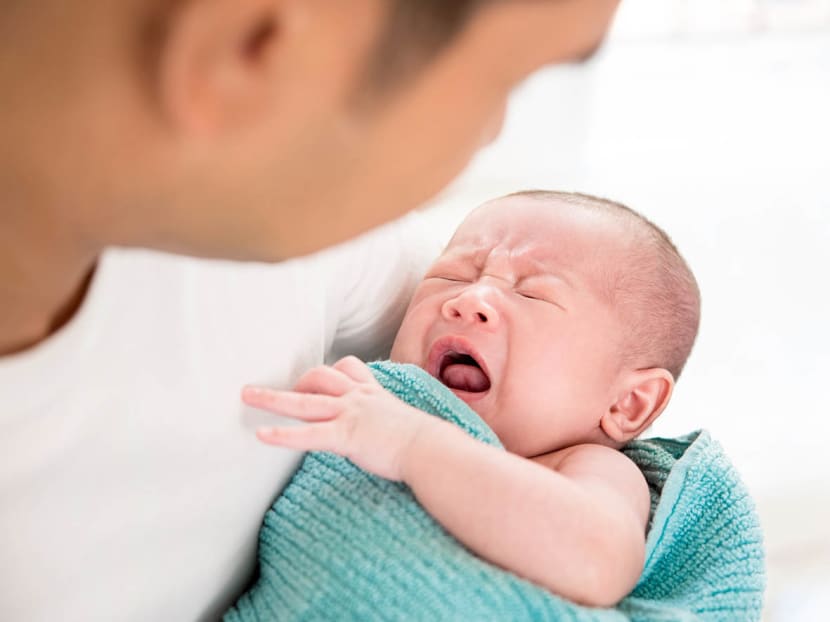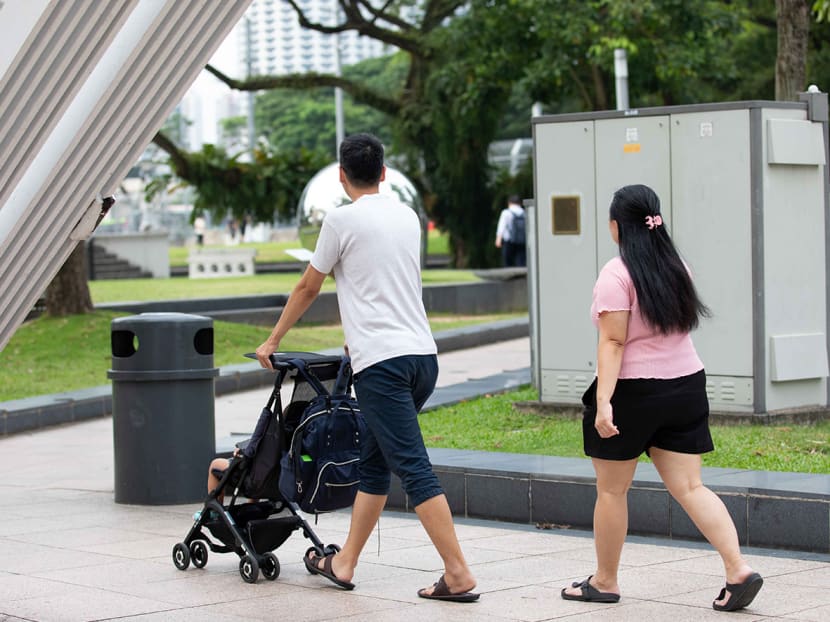The Big Read: Paternity leave helps but for men to take on fair share of parenting, a rethink of gender roles is needed

International studies, including those conducted in Singapore, have found positive effects of adequate paternity leave, including longer-term benefits for marital satisfaction and father-child closeness.
-
Parliament recently passed an amendment to the Child Development Co-Savings Act, doubling government-paid paternity leave to four weeks for fathers of Singaporean children born from Jan 1 next year
-
International studies, including those conducted in Singapore, have found positive effects of adequate paternity leave, including longer-term benefits for marital satisfaction and father-child closeness
-
Experts interviewed also say that increasing paternity leave is essential for reducing maternal stress and promoting gender equality in child-rearing responsibilities
-
However, some fathers TODAY spoke to expressed the need for a more pronounced change in workplace culture to reduce the stigma against taking paternity leave
-
Beyond the workplace, there is also a need for society to rethink traditional gender roles where fathers are seen as the breadwinners while mothers are expected to put family first and careers second
SINGAPORE— A mug of coffee in one hand, and a warmed milk bottle in the other to feed his newborn son as the morning news hummed on the television — this was Mr Khai Asyraf's treasured routine during his two-week paternity leave in 2021.
The 37-year-old managing director recalled his time with his son Khalif: "He's having his milk, I'm having my breakfast, and we're watching the news together — just the two of us. That moment is pretty significant to me, a fresh start to the day, and that's my moment with my son."
Like Mr Khai, Mr Grover — also a newly-minted father — cherished the times he was there to see his two-month-old baby daughter smile, play with her hands and see the world around her. The 35-year-old sales manager, who declined to give his full name, said he would have missed these "precious" milestones and moments if not for his paternity leave.
The issue of paternity leave — which was first introduced in Singapore a decade ago — came under the spotlight again recently when Parliament passed an amendment to the Child Development Co-Savings Act on Sept 19. The change will see government-paid paternity leave double from two to four weeks for fathers of Singaporean children born from Jan 1 next year. The additional two weeks are to be given on a voluntary basis by employers.
The amendment seeks to allow fathers to be more involved in caring for their children from the very beginning.
Paternity leave in Singapore was institutionalised in 2013 under the Act amid a rise in dual-career married couples and declining birth rates. At the beginning, working fathers were given one week of government-paid paternity leave. In 2017, this was increased to two weeks.
Prior to the amendments to the Act earlier in September, the Government reimbursed employers a maximum of S$5,000 for two weeks of paternity leave taken by their employees. The enhancements will double the reimbursement limits for employers.
Back in 2012, when Prime Minister Lee Hsien Loong first broached the idea during that year's National Day Rally, he said that paternity leave was to encourage couples to have more children and allow fathers to participate more actively in the family. "It's necessary to signal the importance of the father's role and shared responsibility in raising children," Mr Lee said.

Two weeks of paternity leave might seem too short a time to adjust to fatherhood, but studies have shown that there are many positive ripple effects when fathers play a more active role right from the beginning. One local study found that paternity leave of two weeks or longer can lead to better family relations, closer relationships between father and child, as well as fewer behavioural problems in children.
The changing societal attitudes towards the role that a father plays — he is often regarded as the family's "breadwinner" rather than "caregiver" — was keenly felt by IT services manager, Mr David Wong, 52. He has four children aged between eight and 18.
"There was a lot of difference between my first three (children) versus my fourth one when it came to taking paternity leave," said Mr Wong.
His first three children were born in 2005, 2007 and 2009, respectively. While his company was considered ahead of its time in offering five days of paternity leave at the time, he still needed to bring his laptop to the maternity ward "in case anything" came up for work.
However, when Mr Wong's fourth child was born in 2015, when the one-week government-paid paternity leave was in place, he felt that there was greater understanding among his colleagues and customers, who tended "to be more supportive and just leave you alone", compared with his experiences when his older children were born.
Despite the benefits of paternity leave, only 40 per cent of eligible fathers took the full two weeks each year from 2018 to 2020, according to the Ministry of Social and Family Development in response to a parliamentary question in February this year.
The relatively low take-up rate could be due to the fact that even though some workplaces are supportive of paternity leave, there still exists a stigma against fathers taking paid time off. This has been raised by several Members of Parliament (MPs) over the years, for example.
Some fathers whom TODAY spoke to also said that for them to confidently take the paternity leave they are entitled to, a more pronounced change in workplace culture is needed first.
BEING PRESENT BUILDS PRESENCE
With a new addition to the family, the first two weeks are about building and establishing a routine around the baby, said Mr Khai's wife, Ms Iffa Khalissa, 30, a professional florist.
"Especially if you're a first-time mum, you've got all the mum things you got to do," she said. "Then the Dad needs to figure out how he's gonna come in and pick up on certain things that mum can choose not to do".
For Mr Khai, those weeks also allowed him to get "hands-on" and "into the thick of things", especially with tasks like bathtime, preparing the bottle and spending time with their baby boy.
"If you want to compare with my first couple of days, I probably take three or four minutes to make a bottle of milk, constantly checking the temperature. Now, I can get it in a split second," he said.
Ms Iffa added: "Doing those little things, of course, and it is very frequent in the day, it's going to help build that bond. There's no other way."
The first few weeks for new parents is a delicate, transitional time.
Mr Grover's wife told TODAY that even though she had hired a confinement nanny and had help from her parents, she still needed her husband by her side.
"Before we became parents, I thought maybe paternity leave would be useless. Actually, we do need both parents; the mums really need our husbands around, not just physically, but also emotionally," said the 33-year-old social worker. "It is very nice to have your spouse around, physically present and being there, and when you have any needs, they can attend to."
She cited chores, such as her husband buying pails for her herbal baths or groceries, which were simple yet immensely helpful and strengthened their relationship. Her husband, Mr Grover, said: "We know that we have each other in this process. Every day, you know you have your partner with you."
Ms Sharlene Chen, 34, an operations manager who has four children between 11 months and 17 years old, stressed that the presence of one's partner is "super important" for a woman emotionally while her hormones settle down post-birth.
"Sometimes, we don't need them to do anything, but just being around is more than enough," she said.
Indeed, her husband, Mr Joshua Lee, 35, a sales executive who took on the night duty for all his children, said that paternity leave notwithstanding, it is up to him as a husband to help Ms Chen "feel better and recover properly".
Ms Iffa stressed that as joyous and wonderful as welcoming a child is, it is also a monumental change that husband and wife have to adapt to.
"I think it's something so fresh, that you don't really know how to feel about it. Having (your husband) present, it's definitely going to be more effective to go through the motions and understand what the transition is about," she said.

For Mr Grover, apart from strengthening marital ties, those two weeks of paternity leave served as "building blocks" for his relationship with his two-month-old daughter and were crucial in his fatherhood journey.
"It's definitely important, I can't imagine coming in at five years old and parenting when your kid has already gone through so many milestones that you missed," he said.
Welcoming the news of more government-paid paternity leave, he noted that two weeks were "not enough". His wife added the enhancement sends the right message to fathers and can encourage them to get more involved.
"Fathers will also have the impression that, okay, I need to step up more to be there for my wife and not just bring home the bacon. Also, physically getting up and doing more practical stuff to support (their wives), as compared to our parents' generation where fathers were quite hands-off," she said.
KNOCK-ON EFFECTS OF PATERNITY LEAVE
Increasing paternity leave in Singapore is "well-warranted" as it allows fathers to be thoroughly engaged in child-rearing, sociologists and psychologists who specialise in parenting and childhood told TODAY.
"The paternity leave will enable new fathers to play a more active role in actual caregiving. It also sends a clear signal from the State that greater paternal involvement is encouraged," said Assistant Professor Cheung Hoi Shan from the Nanyang Technological University (NTU).
"This is crucial in helping families strike a good balance when it comes to care work in the home, especially in our predominantly patriarchal society where women's participation in the labour force is also high," she added.
Asst Prof Cheung is from the Psychology and Child & Human Development department at the National Institute of Education, where she studies parenting practices and their influence on children's social development.
Assistant Professor Gerard Chung from the National University of Singapore (NUS), whose work centres on parenting, fathers and family services in the community, said the increase in paternity leave "empowers fathers" to more effectively organise their responsibilities in taking care of their spouse and helping out around the house during the baby's first month.
When fathers feel empowered and mothers are supported, there is a reduced risk of poor maternal mental health, including depressive symptoms, psychological distress and burnout, according to some international studies.

An empirical study using data from the Singapore Longitudinal Early Development Study (SG LEADS) also showed that with fathers more involved, family conflict and parenting aggravation are also significantly reduced. At the same time, marital satisfaction and father-child closeness are enhanced.
SG LEADS is helmed by sociologist Professor Wei-Jun Jean Yeung from NUS. It was published last year and used data on almost 4,000 children aged under 7.
The study found that a relatively short paternity leave of two weeks can benefit both family dynamics and children's social-emotional outcomes.
Fathers who took longer paternity leave became more involved in childcare activities and other household chores, thus reducing the strain on their wives, which could promote family cohesion and reduce parenting stress.
The study also found that longer paternity leave "would significantly reduce children's behaviour problems through the mediating effects of family dynamics". It suggested that reduced maternal stress, less tension between parents, and stronger bonds between parent and child, would result in fewer behavioural problems in children.
Conversely, the study noted that one week of paternity leave could increase stress for the parents since it may not be long enough for fathers to take full responsibility for childcare and housework.
Shared responsibility aside, an increase in paternity leave is also a step towards gender equality when it comes to child-rearing, said the experts interviewed by TODAY.
"Both parents, not just the mother, need time to adjust to the infant's needs and changes in family dynamics," said Dr Tan Poh Lin, Senior Research Fellow of the Institute of Policy Studies (IPS) at NUS.
"When fathers cannot take leave due to lack of entitlements or support, mothers may have to go through much of this adjustment process on their own," she added.
Asst Prof Cheung also stressed that the traditional script of husbands as "breadwinners" 'and wives as sole "caregivers" hurts both mothers and fathers and "puts undue burden on both parents".

Mothers are already likely to take on more responsibilities, regardless of whether they have a full-time job outside of the home because they are perceived to be the "natural" caregiver, she added.
On their part, fathers may also feel equally torn by expectations that they must prioritise their careers, even though they may, in fact, want to focus more on their family and children.
"The truth is that no one is a born caregiver — fathers and mothers are just as likely to be good caregivers for their children," said Asst Prof Cheung.
'THERE'S NO HANDBOOK'
Fatherhood, for all its joys and excitement, also brings with it a steep learning curve. While Mr Khai equipped himself with books on parenting and fatherhood, there was nothing to prepare him for juggling a newborn and a recovering wife.
"It's very theoretical at the beginning, but when you get into it and you layer it with sleep deprivation, then things start to descend into absolute chaos," he said. "It was pretty challenging because I was trying to manage (the household) on top of working full-time, and then trying to get into this new role."
He added: "There's no handbook that can actually tell you step by step what exactly you need to do."
Mr Joshua Lee and Mr Wong — both fathers four times over — also told TODAY that the birth of each child produced a different set of challenges each time. For Mr Lee, the first few months after the birth of his fourth child last year was a "whirlwind" since it had been eight years since he was last on baby night duty.
A LACK OF EMPATHY AT WORK FOR FATHERS
Besides the stress of caring for a newborn, the pressures of work constantly loom in the background for fathers. Such challenges were highlighted during the parliamentary debate on the Child Development Co-Savings Bill (Amendment) on Sept 18, where MPs welcomed the addition of two weeks to paternity leave but also spoke about how fathers face stigma at work.
"How many times has the office congratulated a co-worker on the birth of their child but also, in the same breath, complained about how much more productive they need to be as they cover their colleagues' work while they are away on leave?" Ms Yeo Wan Ling (Pasir Ris-Punggol Group Representation Constituency) asked.
For Mr Grover, what was supposed to be a straightforward process of requesting paternity leave escalated to talks with the Ministry of Manpower (MOM) before he could take time off from work.
Initially, Mr Grover was not granted his paternity leave; his manager said he could work from home instead of taking his entitled two weeks' break, and did not offer a cover for him.
"I think that was a bit distasteful," said Mr Grover, who had to seek MOM's help to negotiate his paternity leave. While the matter was resolved eventually and he was given paternity leave, he still felt "uneasy" with how the situation "was going to be viewed" by his manager and colleagues.
While Mr Grover was on paternity leave, his work was spread among his colleagues. When he got back to work, he could tell his colleagues — most of whom do not have children — felt "bitter" and gave him the "cold shoulder".
Empathy in the workplace reduces "ambiguity" when it comes to taking paternity leave, said Mr Khai. Even though he had a close working relationship with his boss, he was glad that his boss was having a child of his own, too.

As such, Mr Khai knew that his boss would go through and understand the same hurdles that he, as a first-time father, would also face. This similar circumstance put him more at ease when it came to making arrangements concerning his son.
"If (my boss) didn't go through fatherhood, I would actually feel, oh my god, are you going to understand my situation?" said Mr Khai, who had no problem taking his paternity leave.
To reduce the stigma against paternity leave, employers should normalise the many facets of fatherhood, said Asst Prof Chung.
Asst Prof Cheung added: "Employers must be convinced that paternity leave will not hurt their bottomline, but can, in fact, translate into actual economic benefit for the organisation."
GENDER-NEUTRAL PARENTAL LEAVE NEXT?
In terms of paternity leave, Singapore is still far away from the likes of Scandinavian countries, which are lauded for their generous provisions in this area.
Sweden, for example, offers 480 days of gender-neutral leave, which offers support to the child's primary caregiver regardless of their gender. The entitlement is split equally for each parent should there be two parents in the household. In Finland, paternity leave can last up to nine weeks.
In Singapore, a working mother is entitled to either 16 weeks of government-paid maternity leave or 12 weeks of maternity leave, depending on whether her child is a Singapore citizen and other criteria.
Dr Tan from IPS cautioned that while the practices in Scandinavian countries might seem like a goal to work towards, "we should be sensitive to our own local context and priorities".
"In my view, gender-neutral leave is unlikely to be very popular, given that few working mothers transfer part of their maternity leave to their husbands, even though they are allowed to," she pointed out.
Offering a different view, NTU's Asst Professor Cheung said: "Gender-neutral parental leave may serve to break down some of the traditionally gendered role differentiation within the family, and help families understand that there is no one preferred caregiver for children as a function of the parent's gender."
Ultimately, for men to take on a fair share of parenting, beyond the first few weeks of welcoming an addition to the family, there needs to be a rethink of traditional gender roles in a family.
For example, there is still an expectation for mothers — instead of fathers — to be the ones to take leave from work to look after their children when they are unwell. At a broader societal level, fathers are still seen as the breadwinners while mothers are expected to put family first and careers second.
“I think culture plays a very important role in a home," said Mr Khai.
And in that regard, granting fathers paternity leave to allow them to share the parenting load of taking care of their newborns in the first few weeks could be the "good start to get ourselves more involved”, break out of old mindsets and “be better for our kids”, as Mr Khai put it.











